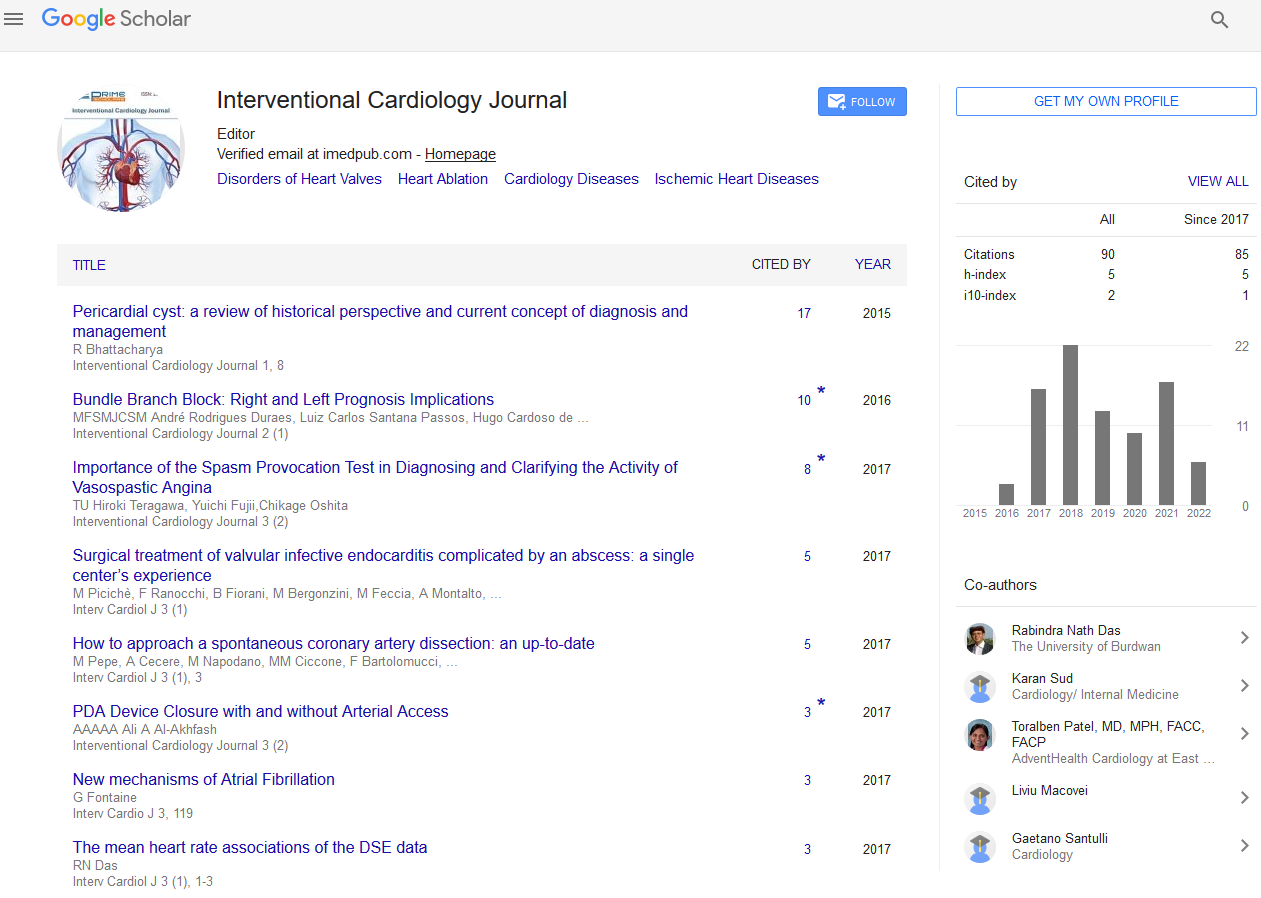Short Communication - (2023) Volume 9, Issue 4
Unveiling the Far Reaching Effects of Cardiovascular Diseases
Aparecida Catai*
Department of Physical Therapy, University Federal de Sao Carlos, Brazil
*Correspondence:
Aparecida Catai,
Department of Physical Therapy, University Federal de Sao Carlos,
Brazil,
Email:
Received: 29-Mar-2023, Manuscript No. IPIC-23-17360;
Editor assigned: 31-Mar-2023, Pre QC No. IPIC-23-17360 (PQ);
Reviewed: 14-Apr-2023, QC No. IPIC-23-17360;
Revised: 19-Apr-2023, Manuscript No. IPIC-23-17360 (R);
Published:
26-Apr-2023, DOI: 10.21767/2471-8157.9.4.31
Introduction
Cardiovascular Diseases (CVDs) stand as a formidable global
health challenge, affecting millions of lives and economies
across the world. These diseases encompass a wide range of
conditions that impact the heart and blood vessels, with consequences
that extend well beyond the cardiovascular system.
This article delves into the diverse effects of cardiovascular
diseases, shedding light on their impact on individuals, families,
communities, and healthcare systems. The most immediate
and direct impact of cardiovascular diseases is on physical
health. Conditions such as coronary artery disease, heart
failure, arrhythmias, and heart attacks can lead to a host of
complications, including: As the heart's ability to pump blood
diminishes, individuals may experience fatigue, shortness of
breath, and decreased tolerance for physical activity. Inadequate
blood supply can damage vital organs, leading to kidney
dysfunction, liver impairment, and cognitive decline. When
blood flow to the brain is compromised due to a blood clot or
a burst vessel, a stroke can occur, causing varying degrees of
neurological damage. Reduced blood flow to the limbs can lead
to pain, numbness, and reduced mobility [1,2]. The diagnosis
of a cardiovascular disease can lead to anxiety and depression,
which can hinder recovery and impact overall well-being.
Description
Living with the constant fear of a heart attack or other cardiac
event can contribute to chronic stress and negatively affect
mental health. Physical limitations and lifestyle changes may
reduce one's quality of life, leading to frustration and a sense
of loss. As physical abilities decline, individuals may withdraw
from social activities, leading to feelings of isolation and loneliness.
The cost of medical treatment, medications, and lifestyle
changes can strain individuals and families financially. Cardiovascular
diseases may affect work capacity and productivity,
potentially leading to changes in career trajectories or even
early retirement. Family members and loved ones may experience
stress and burnout while managing the needs of someone
with a cardiovascular disease. Cardiovascular diseases exert
significant pressures on healthcare systems and economies:
The treatment of cardiovascular diseases, including surgeries,
medications, and long-term care, accounts for a substantial
portion of healthcare spending. Individuals with cardiovascular
diseases may experience reduced productivity, absenteeism,
and increased healthcare-related leave, impacting economic
output. Acute events like heart attacks and heart failure exacerbations
result in frequent hospital admissions, straining
healthcare resources [3-5]. Adopting a heart-healthy lifestyle
through regular exercise, a balanced diet, weight management,
smoking cessation, and stress reduction can significantly lower
the risk of developing cardiovascular diseases.
Conclusion
Medications for controlling blood pressure, cholesterol, and
blood sugar, as well as procedures like angioplasty and bypass
surgery, can manage existing conditions and prevent complications.
Educating individuals about the risk factors, symptoms,
and management of cardiovascular diseases empowers them
to make informed decisions and seek timely medical attention.
Regular health check-ups, screenings, and diagnostic tests help
detect cardiovascular diseases in their early stages, allowing
for timely intervention. Cardiovascular diseases cast a wide net
of effects that touch every aspect of human life, from physical
health to emotional well-being, from individual experiences
to global economies. Recognizing the multifaceted impacts of
these diseases underscores the urgent need for comprehensive
prevention, early detection, and effective management
strategies.
Acknowledgement
None.
Conflict Of Interest
The author’s declared that they have no conflict of interest.
References
- Anderson L, Oldridge N, Thompson DR, Zwisler AD, Reeset K, et al. (2016) Exercise-based cardiac rehabilitation for coronary heart disease: Cochrane systematic review and meta-analysis. J Am Coll Cardiol 67(1): 1-12.
[Crossref] [Google Scholar] [PubMed]
- Goessler K, Buys R, Cornelissen VA (2016) Low-intensity isometric handgrip exercise has no transient effect on blood pressure in patients with coronary artery disease. J Am Soc Hypertens 10(8): 633-639.
[Crossref] [Google Scholar] [PubMed]
- Jansen JR, Schreuder JJ, Mulier JP, Smith JP, Settels JJ, et al. (2001) A comparison of cardiac output derived from the arterial pressure wave against thermodilution in cardiac surgery patients. Br J Anaesth 87(2): 212-222.
[Crossref] [Google Scholar] [PubMed]
- Iellamo F (2001) Neural mechanisms of cardiovascular regulation during exercise. Auton Neurosci 90(1-2): 66-75.
[Crossref] [Google Scholar] [PubMed]
- Theodorou AA, Panayiotou G, Volaklis KA, Douda HT, Paschalis V, et al. (2016) Aerobic and combined training and detraining on body composition, muscle strength, lipid profile and inplammation in coronary artery disease. Res Sports Med 24(3): 171-184.
[Crossref] [Google Scholar] [PubMed]
Citation: Catai A (2023) Unveiling the Far Reaching Effects of Cardiovascular Diseases. Interv Cardiol J. 9:31.
Copyright: © 2023 Catai A. This is an open-access article distributed under the terms of the Creative Commons Attribution License, which permits unrestricted use, distribution, and reproduction in any medium, provided the original author and source are credited.

